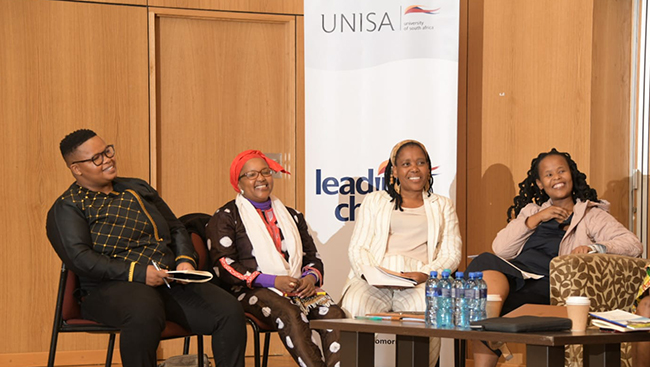News & Media
A conversation with Prof Oyèrónkẹ́ Oyěwùmí
The Department of Leadership and Transformation (DLT) recently hosted a conversation with Prof Oyèrónkẹ́ Oyewumi, facilitated by Prof Grace Khunou, Director of Scholarship Change (DLT) Unisa, at the Dr Miriam Makeba Concert Hall, Muckleneuk Campus, in Pretoria. Dr Babalwa Magoqwana (Nelson Mandela University), Dr Zodwa Radebe (Unisa), Prof Nthabiseng Motsemme (University of Johannesburg), Prof Malehoko Tshoaedi (University of Johannesburg), Prof Edith Phaswana (Thabo Mbeki African School of Public & International Affairs (TM-School, Unisa) and Prof Zethu Cakata (Unisa) were the panellists.
Prof Oyèrónkẹ́ Oyěwùmí
The invention of women: Making an African sense of Western gender discourses by Oyěwùmí presents modern Yoruba gender stratification as a Western colonial construct. She states that the woman question and binary gender are ideas that stem from the West, effectively eliminating their validity in analysing gender relations within African society. She speaks explicitly about the non-sexist and gender-neutral nature of the Yoruba language. Through this deconstruction, she introduces an alternate method of understanding Western and Yoruba cultures in the modern world.
Oyěwùmí begins by naming biological determinism as central to the Western understanding of gender. This idea that biological differences serve as an organising principle for societies is a Western philosophy that doesn't transfer to Yoruba societies, which do not use the body as the basis for any social roles. Oyěwùmí explains how colonial institutions imposed this biological understanding of gender onto the Yoruba. Additionally, she tackles the contradictions in feminist theory that assert gender as a social construct and the subjugation of women as universal. She says that Western feminism's beliefs on gender are not applicable nor relevant across all cultures, citing her own culture of the Yoruba. She explains that gender was never socially constructed in Yoruba society; relative age was the main organising principle.
"If anything, my work is the ultimate evidence about the fact that gender is indeed socially constructed. It didn't come from heaven; it didn't come from nature; there are these categories that are created, historically and culturally. What my work does is to affirm the idea that gender is socially constructed," says Oyewumi.
This links to her larger argument that culture cannot be an explanation for anything because white supremacy and imperialism have created dominant and subordinate cultures in society, which have turned Eurocentric opinion into fact. She calls this "cultures of impunity". Oyěwùmí further critiques Western feminism for generating a homogeneous and ethnocentric structure parallel to modern capitalist society. She describes how black women have been both silenced and objectified within feminism, which leads to unequal representation and feminist consensuses that reflect only the dominant white voices. Oyěwùmí remarks on the irony of this because feminist theory ultimately seeks to destabilise such oppressive patriarchal systems globally. This contradiction leads Oyěwùmí to believe black women need a new space in scholarly spaces where they can be adequately represented. Thus, she calls for a new field, "African Gender Studies", separate from elitist white feminism, wherein the African culture's perspectives on gender and womanhood can be adequately understood and acknowledged.

Dr Babalwa Magogwane, Prof Nthabiseng Motsemme,Dr Zodwa Radebe and Prof Zethu Cakata
The panellist shared their views about the book and how they experienced it. "The book opened a whole new universe of scholarship and a new way of thinking for me. It made me see the world in different colours," said Motsemme.
Radebe said: "Prof Oyěwùmí's book showed us that society is organised by seniority rather than gender." Cakata argued: "Oyěwùmí's work is a testament that knowledge, just the like the sun, dawns at its own hour; this is the hour of invention. It is time for us to learn from ourselves like other nations. The book showed me that language is a true transmitter of a person's value system."
Using the concept of bio-logic determinism, Oyěwùmí reminded us that in African communities, gender was not central in organising the society; however, age and seniority were integral in allocating power and responsibilities. Colonial "body thinking" obsession has then allocated and categorised women into bodies (just like other minority groupings) without access to power and social status. This argument on the "invention of women" in African society generated a lot of discussions and debates about the "universality of gender" or "patriarchy as a given" in the organisation of many African societies.
* By Gugu Masinga, Marketing and Communication Specialist, Department of Leadership and Transformation, Unisa
Publish date: 2023/04/20

 Unisa co-hosts G20 community outreach in the Eastern Cape
Unisa co-hosts G20 community outreach in the Eastern Cape
 Unisans gain membership of prestigious science academies
Unisans gain membership of prestigious science academies
 Advocating for disability transformation through servant leadership
Advocating for disability transformation through servant leadership
 Unisa Press continues to illuminate the publishing space
Unisa Press continues to illuminate the publishing space